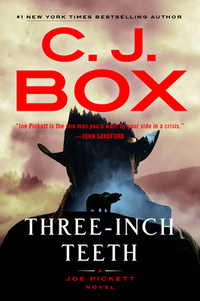Battle Mountain by C.J. Box
 Friday, February 28, 2025 at 7:58AM
Friday, February 28, 2025 at 7:58AM 
Published by G.P. Putnam's Sons on February 25, 2025
C.J. Box is capable of writing decent thrillers when he isn’t distracted by the need to feed red meat to extremists. To be fair, Box might not be pandering to a particular audience. He might simply be writing about the kind of people he meets in Wyoming. Joe Pickett, the game warden who is the series’ protagonist, studiously avoids expressing political opinions. On the other hand, Pickett never denounces the crazy views that other characters espouse, including the conspiracy theories embraced by his best buddy, Nate Romanowski.
I’m a bigger fan of the early novels in the series, but some of the later ones, including Battle Mountain, avoid culture wars and remind readers that Box is a capable storyteller. The latest Joe Pickett novel’s downside is its focus on Romanowski rather than Pickett.
A governor who used Pickett as his errand boy before leaving office has won another term. That’s unlikely, given that the governor is a Democrat. It’s been fourteen years since a Democrat held that office in Wyoming, but this is fiction. I welcome the governor’s return and hope he’ll help the series revisit its roots.
The governor sends Pickett to the southern part of Wyoming to look for his son-in-law, who has (at the governor’s urging) taken a gig as an assistant to an elk hunting guide. The son-in-law, Mark Eisele, hasn’t checked in with his wife for a couple of days. Neither the governor nor Pickett know that Eisele and his boss stumbled upon a group of armed men who are holding them as prisoners.
The armed men intend to attack a gathering of people who call themselves Centurions. The Centurions are leading members of the military-industrial complex. They gather at a resort in Wyoming every year so they can make deals, get drunk, wear silly costumes, and bang prostitutes. The armed men who want to kill them are a collection of left-wing anarchists and right-wing disgruntled ex-military.
The grievances of the former soldiers are hard to understand. They complain that America sent them to wars they weren’t allowed to win. That sounds like Vietnam to me, but the former soldiers aren’t that old. One of them is unhappy about the way America withdrew from Afghanistan, a complaint that would be more legitimately voiced by abandoned Afghanis than American soldiers. None of their complaints seem like persuasive reasons to attack military leaders at a resort, but again, this is fiction, so I accepted the premise for the sake of being entertained by the unlikely plot.
Pickett will eventually encounter the domestic terrorists, but not before Romanowski finds them. Romanowski is a psychopath. He’s been on a revenge tour ever since his wife was killed. Earlier in the series, Romanowski killed three of the four men he blames for her death. The object of his wrath in Battle Mountain is the fourth man, Alex Soledad.
Romanowski left his daughter Kestrel with Pickett so he could run around killing people. Not ideal parenting behavior, but Pickett and his wife are responsible adults, which is more than anyone could say of Romanowski. Kestrel might have a chance at a normal life if she isn’t raised by a psychopath.
Romanowski is joined in his quest by Geronimo Jones, another disgruntled veteran who wants to make Soledad dead. In the kind of unlikely coincidence that is common in modern thrillers, Soledad is leading the domestic terrorists in their attack on the resort.
Some parts of the novel are just silly. Romanowski has acquired the power to mind meld with his falcon, allowing him to enter a trance that allows him to see terrain through the falcon’s eyes. Romanowski and Geronimo gun down anarchist “hippies” (meaning young liberals) but spare terrorists who once served in the military because they share Romanowski’s delusional belief in conspiracy theories. Ivy League universities are condemned as bastions of liberalism without acknowledging that Justices Kavanaugh, Gorsuch, Alito, Thomas, and Roberts — conservatives all — graduated from Ivy League law schools. So did Scalia, for that matter. But the novel is accurate in its depiction of irrational thought that drives so many nutcases, so I can’t complain that Box populates his novels with the kind of lunatics who are drawn to sparsely populated states like Wyoming.
The plot generates some excitement on its way to a predictable ending. The story moves quickly. While the descriptions of Wyoming's mountains might be more enjoyable than the standard thriller plot, Battle Mountain is worth saving for a beach read when summer arrives.
RECOMMENDED



